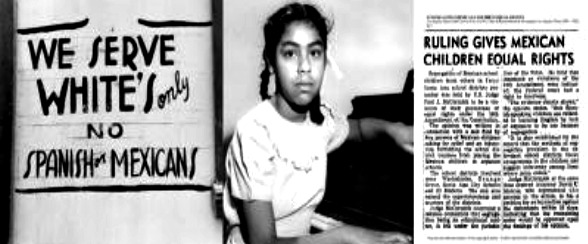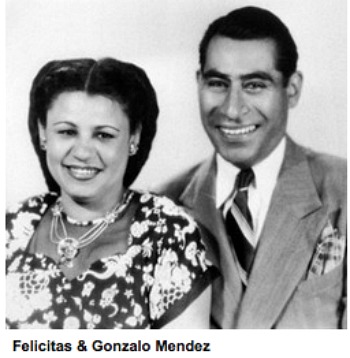In September 1943, Gonzalo Jr., Sylvia and Jerome Mendez went with their aunt, Soledad Vidaurri, and three cousins to enroll at the local elementary school, 17th Street School, in Westminster, California. The 17th Street School was considered a “white school.” While the Vidaurri children were admitted without incident due to their skin color and French surname, the children of Gonzalo and Felicitas Mendez were segregated into a “Mexican school” that was further away from their home.
In the 1940s, Mexican-Americans were considered “white” and typically unaffected by segregation laws, but they still faced de facto segregation and anti-Mexican sentiment. In fact, the Mendez children had attended “white schools” until they moved to Westminster. Also worth noting is that both Gonzalo and Felicitas were U.S. citizens. In fact, Felicitas was Puerto Rican, not Mexican. All of the Mendez children spoke fluent English.
Gonzalo and Felicitas Mendez were appalled by this treatment of their kids. In response, they launched what turned out to be a ground-breaking civil rights case. Mendez v. Westminster ultimately helped outlaw almost 100 years of segregation in California and set legal precedent for the Brown v. Board of Education case, filed seven years later.
After his children were refused enrollment at 17th Street School, Gonzalo attempted to advocate on their behalf and met with the superintendent. An agreement could not be reached, and the Mendez family would not enroll their children some 10 blocks away at the “Mexican school.” Instead, Gonzalo, a cafe owner, had the means to hire an attorney.
The Mendez family hired Los Angeles civil rights attorney David Marcus. On March 2, 1945, Marcus filed Mendez v. Westminster, a class-action lawsuit against four Orange County School Districts: Westminster, Santa Ana, Garden Grove and El Modena, now Eastern Orange. The lawsuit was filed on behalf of over 5,000 students in similar situations and sought an injunction that would order schools to integrate. Five brave Mexican-American fathers put their names on the briefs: Thomas Estrada, William Guzman, Gonzalo Mendez, Frank Palomino and Lorenzo Ramirez. After an appeal, the now-famous case known as Mendez, et al v. Westminster School District of Orange County was upheld in San Francisco by the Ninth Circuit Court of Appeals on April 14, 1947.
I asked local attorney Timothy P. Prince why Gonzalo Mendez was named as lead plaintiff. In this case, Mendez was the first to contact the attorney and funded the majority of the fees involved. He also explained that there is no legal significance attached to being lead plaintiff; the outcome affected all the plaintiffs in the same way–ending discrimination against Mexican-Americans in public school enrollment.
The ruling of the Mendez case had a great impact on education in California. In the case, the Judge ruled,
“The equal protection of the laws pertaining to the public school system in California is not provided by furnishing in separate schools the same technical facilities, textbooks and courses of instruction to children of Mexican ancestry that are available to the other public school children regardless of their ancestry. A paramount requisite in the American system of public education is social equality. It must be open to all children by unified school association regardless of lineage.”
The Mendez case is now part of educational history, but it really was not all that long ago. Sylvia Mendez is now 81 years old and lives in Fullerton, California, not far from Westminster. She still does several speaking engagements. I have had the pleasure of hearing her speak and tell the amazing story.
On March 28, 2018, the Westminster City Council voted to approve plans for a park and monument to the Mendez family and has previously named a bike path in the family’s honor.
It’s important to remember the struggles of those who came before us. This case is a reminder that in many ways, things really have not changed much, as much of the Mexican-American community continues to struggle to obtain a just and equitable education.


